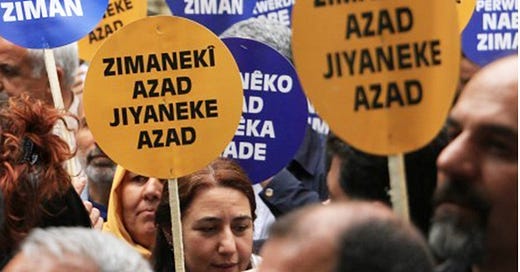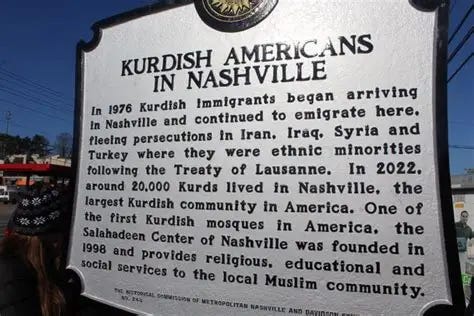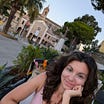When I learned about Kurdish culture and decided I wanted to help the Kurds, I needed to take the time to listen to them and value who they were as a people. What was their history? How did they define themselves and the world around them? To take the first steps in this regard, the most sensible thing I could think of was to learn the Kurdish language. To connect with someone and understand them, regardless of who they are, communication is the most basic component of seeing people for who they truly are. How could I help the Kurds if I didn’t take the time to learn how to speak to them? Before meeting with the Kurds, I reviewed some basic videos on teaching Kurdish and gained enough knowledge to have general conversations with them. The hard part, then, was finding Kurds to practice with and getting to know what kind of people they were.
I lived close to Nashville at the time. Nashville has the largest Kurdish population in North America, with approximately 20,000 Kurds residing in the city. In 2020, I traveled there to practice my Kurdish and explore ways to contribute to the Kurdish community. When I finally met Kurds I could speak Kurdish with, we hit it off! Being an American who speaks Kurdish has helped me make friends among Kurds ever since.
As I spoke with more Kurds, I began to notice certain things. Sometimes, when I heard other Kurds speak, it didn’t sound like Kurdish. I thought at first I just needed to learn more Kurdish, but then I noticed the words they were saying didn’t quite have the same cadence or structure as Kurdish. There were even times when, as I was speaking Kurdish to them, many Kurds didn’t know what I was saying. What was going on?
Later, one of my friends explained to me why I was having difficulty understanding other Kurds; they were switching between Kurdish and Turkish. I didn’t understand what my friends were saying because they still needed as much knowledge about their language as I did.
Many of the Kurds I met were from Northern Kurdistan (Bakur), within Southeastern Turkey. In the Turkish Republic, Kurdish isn’t allowed in the schools and legal administrations, resulting in Turkey’s criminalization of the language that continues in the country. Many of my friends, while learning Kurdish at home, knew Turkish better because it was the language of the schools in Turkey. Some of them even recounted memories to me of their teachers beating them because they didn’t learn Turkish until they started school. The teachers abused and harassed them until they spoke Turkish completely. These beatings led to a long experience of torture for them every day in the classroom as my friends were growing up.
Hearing these experiences made me realize that, in my pursuit of improving my communication with the Kurds to help them, I needed to understand how they didn’t know themselves completely. Helping them was not simply a matter of political advocacy or bringing aid to the Kurds; it needed to become a task of showing them who they are and what the Kurdish identity is worth.
The Kurds have the unfortunate luck of dealing with the mentality of othering from the countries in which they reside. Arguably, the most brutal form of cultural genocide the Kurds suffer now is the marginalization of the Kurdish language. Throughout their history to today, the governments that occupy Kurdistan have limited the Kurds’ use of their language in a variety of ways. Turkey’s criminalization of the language is still in place to a certain degree today, and Iran only uses Farsi in its schools’ curriculum. It has put Kurdish culture at the risk of complete erasure, with many Kurds not even familiar with the history of their own culture or being able to speak Kurdish.
Due to the Kurds’ minority status throughout history, particularly as the largest ethnic group without a country of their own, many of the Kurdish language’s developments have coincided not only with linguistic developments and literary contributions. The advances in the Kurdish language coincided with the preservation of Kurdish culture and heritage. From the poetry of Ahmed Xanî to Celadet Alî Bêdirxan’s Latin alphabet for the Kurdish language, nearly all of the Kurdish language’s significant developments stemmed from a need to preserve Kurdish culture and ensure that it would not lose itself in the obscure parts of history.
The Kurdish language is an Indo-Iranian language that contains several different dialects. Some of the more widespread and well-known dialects of Kurdish include Kurmanji, Sorani, Zazaki, and Behdini. These dialects exist in various regions of Kurdistan, with Kurmanji speakers primarily residing in Northern Kurdistan within southeastern Turkey and Western Kurdistan within Northern Syria (Bakur and Rojava, respectively), Zazaki in the north, Behdini in Southern Kurdistan within Northern Iraq (Bashur), and Sorani in both Bashur and Rojhelat (Eastern Kurdistan, within Northwestern Iran). Behdini and Sorani use the Arabic script for their alphabet, while Kurmanji and Zazaki use the Latin alphabet.
The Kurdish language is more than the sum of its parts. It is not simply linguistic characteristics that define this language, but also the historical conditions surrounding the Kurds and how their linguists chose to address them. It is the Kurds’ cultural context that ultimately shaped the language into what it is today. Understanding how the Kurdish language connects to its history is crucial for recognizing this connection.
The death of the Kurdish language is the death of Kurds. To lose their language is to lose their history, their ideas, and the very foundation that makes them who they are. It makes carrying on that language, preserving its history and characteristics, more vital now than ever.
This article is part 1 in a series on the Kurdish language. Click here to read part 2!








Gelek spas, birayê min! Just subbed you! Thank you for sharing that! Dilê min bi Kurdan germ e! 🥰❤️☀️💚✌🏼
Woah. This is devastating! I didn’t know this about the Kurds. Thank you for sharing this and I look forward to the rest of the series! I’m always fascinated by cultures and languages so this is right up my alley. 💙